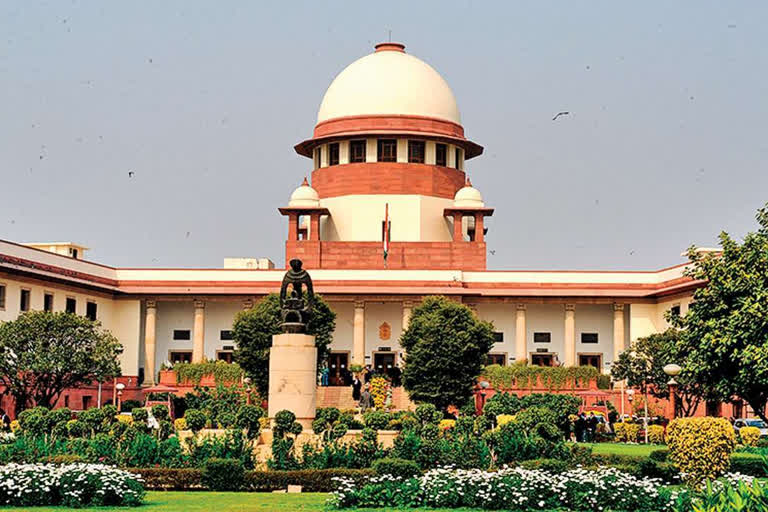New Delhi: The CBI on Wednesday told the Supreme Court that it did not require prior consent from the West Bengal government to investigate a case of alleged illegal mining and transportation of coal in the state, as the purported offence had taken place within the 'railway areas'.
Therefore, given the above and keeping in mind the facts and circumstances of the present case, it is clear that not only can the present respondent (CBI) conduct investigation in railway areas' without the prior consent of the state government but, such power in furtherance of the investigation, transcends to other areas beyond the railway areas', within the territorial jurisdiction of the state of West Bengal, the affidavit said.
The counter-affidavit was filed in the top court which is hearing a plea challenging the Calcutta High Court order which had allowed CBI to probe the case without the state's consent.
Read:| SC to hear plea against CBI probe in WB coal mining case on March 10
The apex court on March 1 had granted time to CBI to file its response to the appeal of Anup Majee, the director of a company engaged in purchase and sale of the dry fuel, who is an accused in a case of alleged illegal coal trading in the Asansol-Raniganj belt of West Bengal.
West Bengal government had contended that since permission to the CBI to carry out any probe in the state was withdrawn on November 16, 2018, no investigation for offences committed within its territorial jurisdiction can be conducted by the central agency.
The matter came up for hearing before a bench comprising Justices D Y Chandrachud and M R Shah which granted liberty to the parties to file a rejoinder to the CBI's counter-affidavit and listed the matter for hearing on March 15.
In its counter affidavit, the CBI has said that West Bengal had in 1989 granted a general consent as required under section 5 of the Delhi Special Police Establishment (DSPE) Act, thus empowering the probe agency to investigate within the territorial jurisdiction of the state.
It said subsequently, the state withdrew its consent through November 16, 2018 notification.
Read:| CBI raids at various places in coal smuggling case
It is submitted that the said withdrawal has no bearing on the power of the CBI to register FIRs concerning offences in railway areas' and take consequential steps in pursuance to such investigation'. It is submitted that the respondent (CBI) was well within the powers conferred to it while initiating and continuing to conduct the instant investigation, it said.
It is submitted that at the outset, the CBI must inform this court that in the investigation conducted so far, it is discernible that officers of the central public sector undertaking, in collusion with the private persons of various areas, and conjunction with the local officers, were illegally extracting, transporting and enabling the sale of coal, the affidavit said.
It further said the same is being carried out across more than one state in the country.
Referring to the FIR lodged in the case, the CBI said that the probe relates to various facets concerning the Railways and the accused were allegedly engaged in facilitation and conduct of illegal mining and transportation of coal by Railways.
It is submitted that in respect of investigating offences that have been committed in Railway Areas', it is inconsequential whether the concerned state government has accorded its consent or not, as the DSPE Act unequivocally grants the power to investigate in such case to the respondent (CBI) herein, the affidavit said while seeking dismissal of the plea.
Read:| Opening commercial coal mining is good but clear the mess too
Further, it is submitted that the object of including railway areas' within the jurisdiction of the CBI to investigate, was that the railway areas are spread across the country, overlapping into the territories of various states and thus if the CBI was to undertake consent from every state before investigating such cases, it would completely defeat the purpose sought to be achieved by the DSPE Act, it said.
It said that Eastern Coalfields Limited (ECL) has filed an application in the matter bringing on record certain import facts about the case and has informed that according to the order passed by the division bench of the high court, the ECL had made an application last month to the Central Vigilance Commission (CVC) to fulfil its obligations as a responsible public sector undertaking.
The affidavit said that CBI is under the mandate of the CVC to continue and complete the investigation.
It said that coal-bearing areas are spread across various states in the country and therefore, the larger conspiracy and inter-state dimension must be thoroughly probed by an agency having national jurisdiction, like the CBI.
It referred to the Calcutta High Court Rules and said the appeal before the division bench there was instituted and adjudicated upon, following the law and is thus maintainable.
On February 12, a division bench of the High Court had stayed a single bench order that had restricted a CBI investigation into alleged illegal mining and transportation of coal to just railway areas of the state and rejected the plea of Majee for grant of protection from any coercive action against him.
PTI
Read:| Money from Assam's illegal coal mining being diverted to militant outfits



